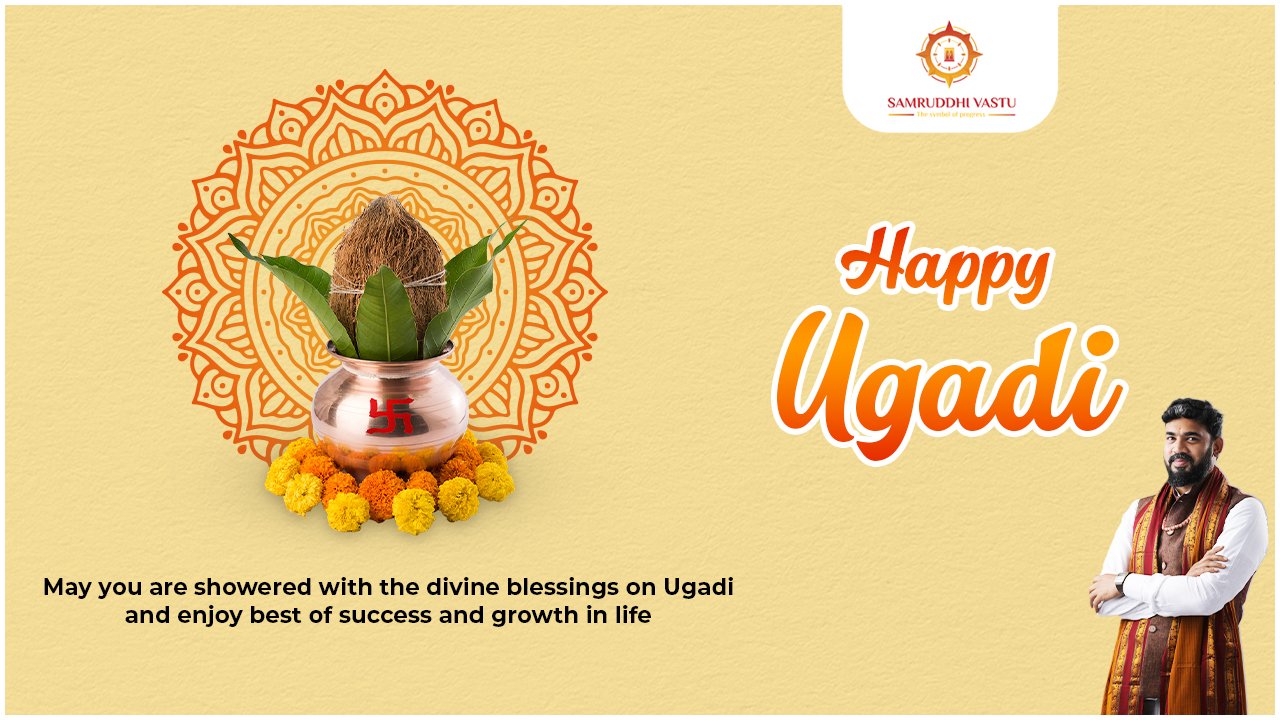Ugadi, oh what a celestial symphony it brings! It’s more than just a date on the calendar; it’s a gateway to a new age, a fresh beginning pulsating with ancient wisdom and cultural richness. In the heartlands of Andhra Pradesh, Telangana, Karnataka, and Goa, India, Ugadi unfurls its magic, weaving together threads of tradition and spirituality.
Yugadi / Ugadi Significance
Derived from the Sanskrit words ‘yuga’ and ‘adi’, Ugadi signifies the dawn of a new epoch, a time for rebirth and rejuvenation. As the Gregorian calendar inches toward late March or early April, Hindus across these regions immerse themselves in the tapestry of rituals and festivities, cherishing every moment as sacred.
Gudi Padwa in Maharashtra, Ugadi in Andhra Pradesh and Telangana, and Yugadi in Karnataka – each name resonates with the rhythm of tradition, carrying forth the legacy of generations past. It’s a time when homes come alive with vibrant Muggulu or Rangoli, each pattern a reflection of hope and prosperity.
Ah, the aroma of mango leaves adorning doorways, whispering tales of abundance and fertility. Charity flows freely, like a river of compassion, as hearts open wide to embrace the less fortunate. Oil massages and ceremonial baths cleanse not just the body, but the soul, preparing one for the journey ahead.
And then, there’s the legendary Pachadi. A dish so divine, it tantalizes the taste buds with its symphony of six flavors. Sweet, sour, bitter, tangy, spicy, and salty – each taste a metaphor for life’s myriad experiences. It’s like celebrating life with food, reminding us to enjoy every moment of the year ahead.
But in the midst of all the fun and delicious food, let’s not forget what Ugadi is really about. It’s a time to find peace in the presence of something greater than ourselves, to acknowledge the forces that shape our lives. As we pray and seek blessings in temples, let’s also take a moment to look inward and recognize the divinity within us.
Ugadi, with its mix of colors and flavors, encourages us to pause, reflect, and appreciate the cycle of life. It reminds us that even in our darkest moments, there’s always hope for a new beginning.
So, as we come together with our loved ones to celebrate Ugadi, let’s do it with grateful hearts and joyful spirits. Because in this moment of laughter and connection, we find the true beauty of life – love, togetherness, and the promise of starting anew.
How is Ugadi Celebrated in India?
As Ugadi draws near, excitement fills the air for this week-long celebration packed with cherished traditions. It’s more than just a single day; it’s a journey of getting ready, showing the strength of our spirits and the beauty of starting anew.
Everywhere you look, homes buzz with activity as brooms sweep and floors shine bright with polish. Doorways burst with vibrant decorations, with colorful Rangoli patterns offering prayers for a year as lively as the hues around us.
As the sun rises, a calm settles over the world, interrupted only by the gentle splash of oil in our cleansing baths. This ancient ritual washes away the old, welcoming in the new as we slip into fresh clothes, each thread promising new beginnings.
Mango leaves, symbols of fertility and wealth, decorate temples, homes, and shops, silently asking the gods for blessings on our endeavors. Dreams take flight on this special day, with Ugadi bringing promises of success and prosperity.
And what’s a celebration without delicious food to delight our senses and warm our hearts? Pachhadi, a blend of sweet, sour, bitter, tangy, spicy, and salty flavors, dances on our taste buds, reminding us to savor every moment.
Let’s not forget the mouthwatering dishes like Holige and Puliogure, fit for royalty and steeped in tradition. These Karnataka favorites tell stories of our rich culinary heritage.
But beyond the feasting and fun, there’s a deeper meaning to Ugadi – the reading of the Panchanga, predicting the year ahead. It’s a chance to reflect on our destinies, as wise elders share their insights and advice.
As the day goes on, cultural events fill the streets with joy and unity. Exchanging gifts becomes a gesture of love, binding us closer together in shared appreciation.
As we say goodbye to the old and welcome the new, let’s do so with hopeful hearts and open minds. Ugadi isn’t just a festival; it’s a celebration of life’s journey, reminding us that even in tough times, there’s always a light at the end of the tunnel.
May this Ugadi bring peace, joy, and prosperity to all who celebrate, shining as a beacon of hope in uncertain times. And as we step into the future, let’s do so with bravery and grace, knowing that the best is yet to come.
Date, Time, Muhurat
Ugadi, is celebrated on 9th April , 2024.
Pratipada Tithi Begins at 11:50 PM on 8th April, 2024
Pratipada Tithi Ends at 08:30 PM on 9th April, 2024
It is also known as the Telugu New Year, heralds the dawn of a fresh beginning in the Telugu calendar. Falling on the first day of the Chaitra month, Ugadi holds significant importance in Hindu calendars across various regions, being celebrated as Vikram Samvat and Bhartiya Nava Varsha. While Ugadi garners immense popularity in Andhra Pradesh and Telangana, it is observed as Gudi Padwa in Maharashtra and Yugadi in Karnataka.
Furthermore, Ugadi, often referred to as Samvatsaradi, symbolizes the commencement of a new Samvat, a 60-year cycle associated with the position of Jupiter. Each year within this cycle is designated a specific name, and predictions for the upcoming year are made based on the characteristics of the new Samvat.
Regarding deities, Ugadi does not have a specific patron deity. However, a cherished tradition during this auspicious occasion is the gathering of people to listen to the recitation of the Panchangam of the New Year. This ritual, known as Panchanga Sravanam, is an informal social function where revered elders read out the Panchanga, providing yearly forecasts based on individuals’ Janmarashi, or moonsigns.
Some of the important Ugadi rituals
- taking oil bath i.e. Abhyang Snan
- hosting flag in home
- eating tender leaves of Neem with jaggery
- Panchanga Sravanam
- beginning of Chaitra Navratri
Regional Variations of Ugadi
North India: In most North Indian states, Ugadi coincides with the beginning of Chaitra Navratri, a nine-day festival that culminates with Rama Navami. However, Ugadi is primarily celebrated in Andhra Pradesh and Telangana, following the Amanta calendar. In states following the Purnimanta calendar, such as North Indian regions, the New Year starts 15 days prior to Chaitra Pratipada or Ugadi. Thus, in Purnimanta calendars, the New Year begins on the day after Holika Dahan. Despite these differences, most Panchang updates, including the Vikram Samvat and Shaka Samvat, occur on the same day.
Karnataka: In Karnataka, Ugadi is known as Yugadi and holds immense significance, marking the commencement of the New Year in the Kannada Calendar.
Maharashtra: In Maharashtra and Konkani regions, Ugadi is observed as Gudi Padwa. While the rituals may differ slightly from Ugadi, the essence of the day remains the same, symbolizing the beginning of the New Year in the Marathi Calendar.
Rajasthan: The Marwari community in Rajasthan celebrates Ugadi as Thapna, which signifies the New Year in Rajasthani and Marwari calendars. Additionally, homas, or Yajnas, are conducted on the day of Thapna.
Sindhis: For the Sindhi community, Ugadi is celebrated as Cheti Chand. This significant festival is observed on the second day of Chaitra Shukla Paksha according to the Hindu calendar, often one day after Ugadi.
Bali and Indonesia: Hindus in Bali and Indonesia commemorate Ugadi as Nyepi, embracing its spiritual significance in their own unique way.
Ugadi Recipes: Among the various traditions associated with Ugadi, Ugadi Pachadi stands out as a beloved dish. This iconic recipe, also known as Bevu Bella in neighboring Karnataka, consists of jaggery, raw mango pieces, neem flowers, and tamarind, symbolizing the diverse flavors of life.

